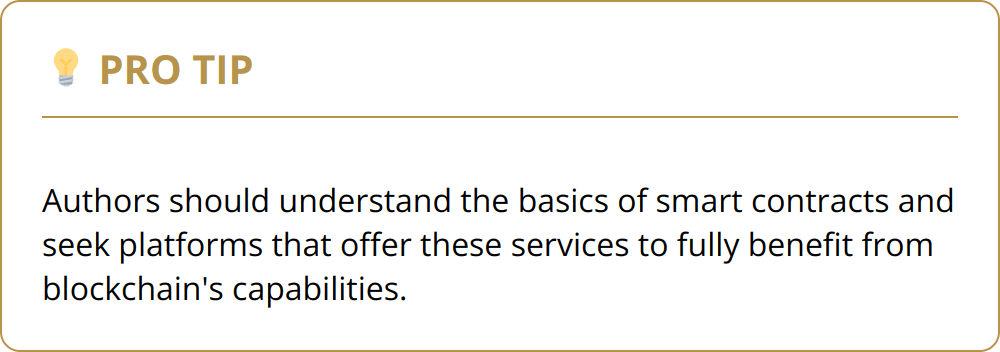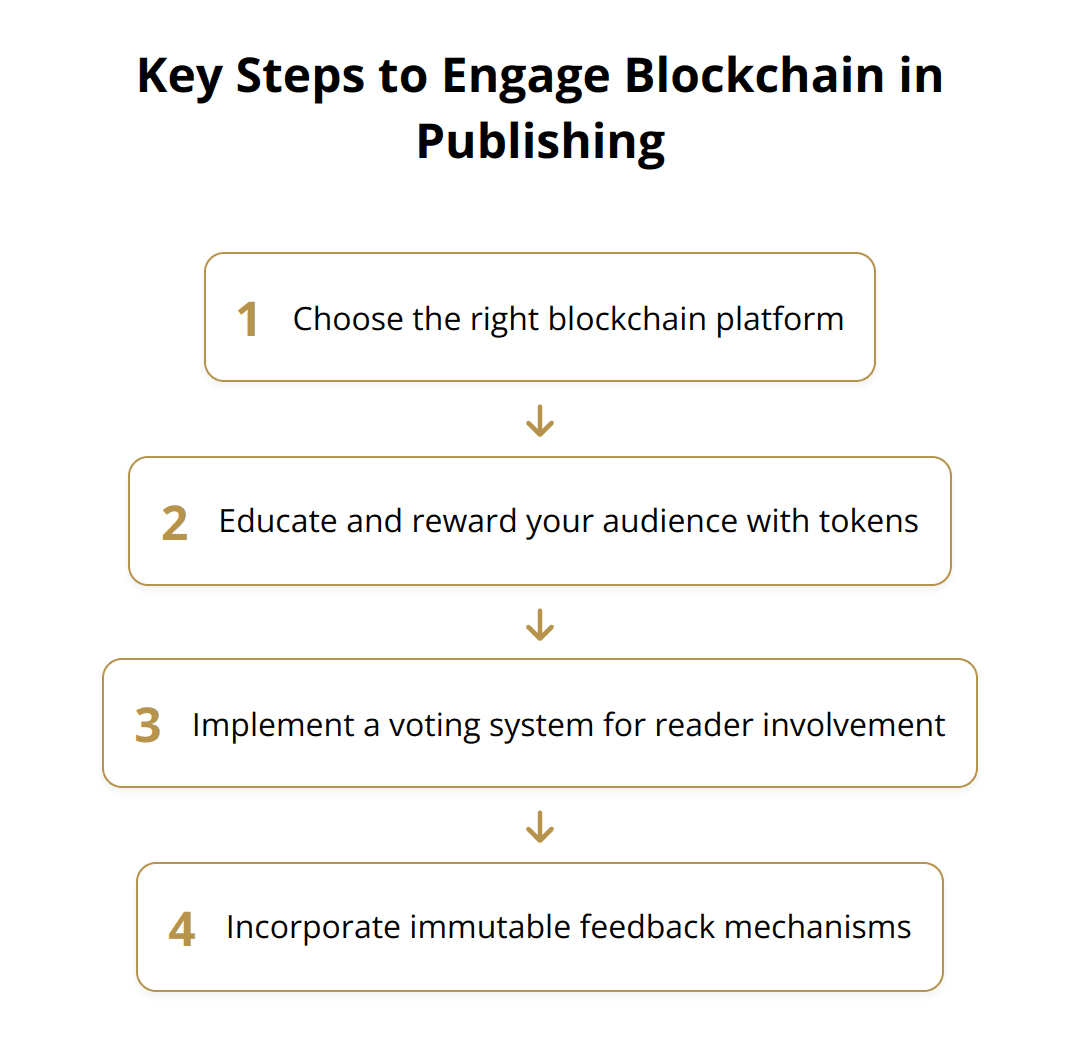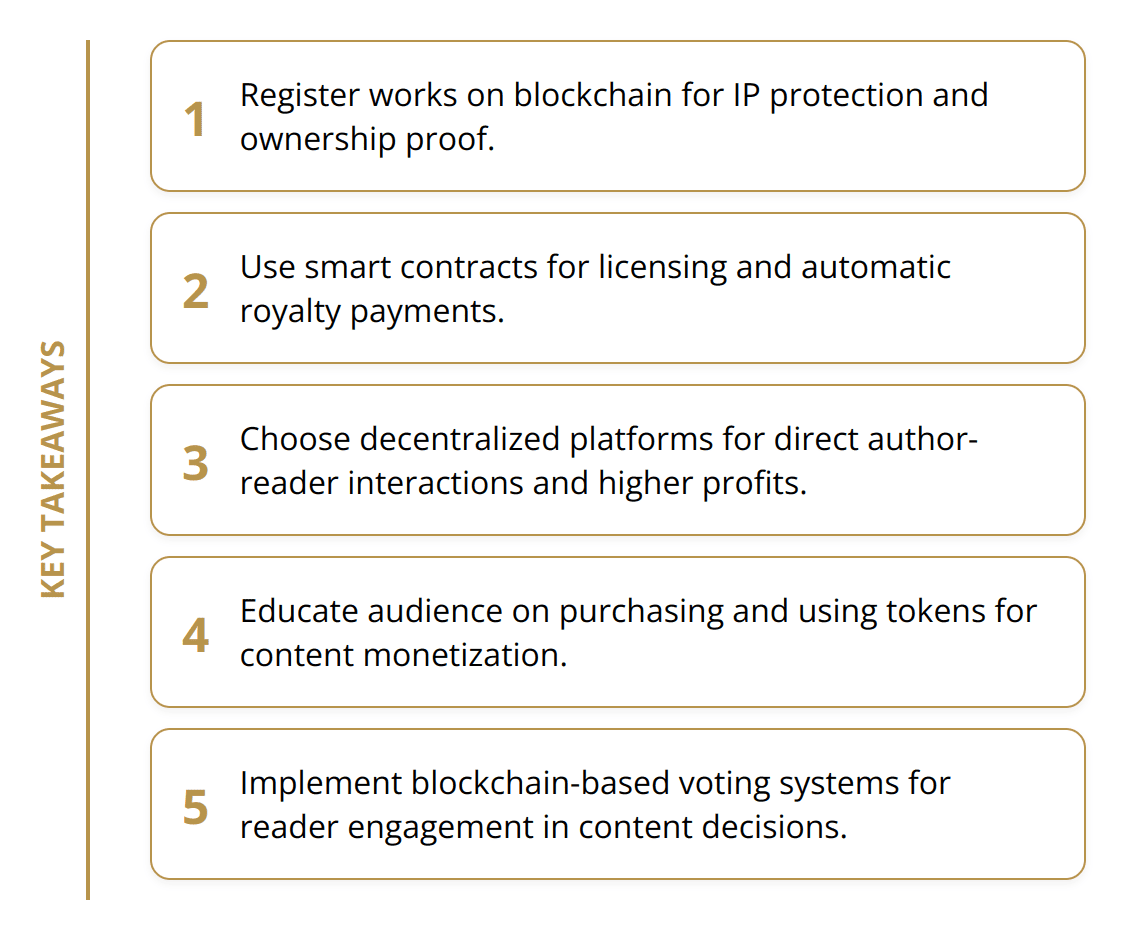Blockchain technology is revolutionizing industries across the globe, and the publishing sector is no exception. Its impact on intellectual property rights, distribution, sales, and reader engagement presents a new frontier for authors and publishers alike.
Here at Beverly Hills Publishing, we are keenly observing how blockchain can transform the traditional challenges of the publishing world into opportunities for innovation and growth. Let’s explore the dynamic role of blockchain in shaping the future of publishing.
Impact of Blockchain on IP Rights
Blockchain technology is rapidly becoming a game-changer in the realm of publishing by offering robust solutions for safeguarding intellectual property (IP) rights. It is giving authors and publishers unprecedented control over their work, streamlining copyright management, and significantly curtailing piracy and unauthorized use. This advancement injects a much-needed dose of efficiency and transparency into the publishing processes.

Reinforcing Authors’ IP Control
Blockchain creates a decentralized ledger that records every transaction or interaction with a digital work. This feature is a boon for authors seeking to protect their rights. When a work is registered on a blockchain, it bears a timestamp that provides indisputable proof of ownership. This process not only deters unauthorized distribution but also establishes a clear trail of ownership, should disputes arise.
To leverage blockchain effectively, authors should register their works immediately after creation. Engaging with platforms that support blockchain registration of creative content can provide a layer of security that traditional copyright registration lacks. This proactive step ensures authenticity and validates the creator’s claim to original works.
Streamlining Copyright Management
Blockchain simplifies copyright management by automating the licensing and rights agreements through smart contracts. These contracts execute automatically when conditions are met, reducing the need for intermediaries and minimizing the potential for human error. This can be a significant advantage for publishers managing multiple copyrights across various territories.

Authors and publishers can use smart contracts to license works, track usage, and receive royalties directly. This automation makes the revenue collection process more efficient and transparent, ensuring that creators are fairly compensated for their work. It’s advisable for authors to understand the basics of smart contracts and seek platforms that offer these services to fully benefit from blockchain’s capabilities.
Reducing Piracy and Unauthorized Use
The immutable nature of blockchain makes it a formidable tool against piracy. Each transaction or access to the copyrighted material is recorded, making it easier to track and identify unauthorized distributions. This transparency is a deterrent to piracy, as it links every interaction with digital content back to its original source.
Furthermore, blockchain enables the creation of encrypted digital watermarks that can be embedded into digital files. These watermarks are invisible and difficult to remove, offering another layer of protection against piracy. Authors should consider services that provide blockchain-based watermarking as part of their publishing strategy.
In conclusion, embracing blockchain technology can significantly enhance the protection, management, and monetization of intellectual property in the publishing industry. By understanding and utilizing this technology, authors and publishers can protect their creative assets more effectively than ever before. For detailed insights into copyright management and protecting intellectual property, exploring authority branding and thought leadership can offer additional valuable information.
Transforming Sales and Distribution
The advent of blockchain technology is significantly altering the landscape of sales and distribution within the publishing industry. By offering decentralized platforms and utilizing smart contracts, blockchain technology ensures direct and transparent transactions between authors and readers, redefining traditional methods that have long dominated the sector.
Decentralized Platforms Break New Ground
In the realm of publishing, decentralized distribution platforms mark a monumental shift away from conventional centralized systems. These platforms facilitate direct interaction between content creators and consumers, removing the need for intermediaries. Consequently, authors enjoy higher profits, while readers benefit from reduced costs.
The key is to select a platform that aligns with your content and audience. Certain platforms may offer better support for specific genres or formats such as ebooks, audio books, or digital magazines. Researching and choosing the right platform can significantly impact your reach and revenue.

Smart Contracts Revolutionize Royalties
The implementation of smart contracts in blockchain technology is nothing short of revolutionary for managing royalties. By automating transactions, smart contracts ensure that authors receive their due payments instantly when a sale occurs. This system eliminates delays and discrepancies often associated with traditional royalty payments.
Authors should familiarize themselves with the workings of smart contracts to tap into this automation advantage. Engaging with a tech-savvy legal advisor can help in crafting contracts that precisely match the author’s requirements.
Sales Reporting Becomes Transparent
One of the perennial challenges in the publishing industry has been the opacity of sales reporting. Blockchain technology introduces an unprecedented level of transparency, allowing authors to monitor real-time sales data. This visibility not only builds trust between authors and platforms but also empowers authors to make data-driven decisions regarding their marketing and sales strategies.
For real-world usage, authors should prioritize platforms that offer comprehensive analytics tools. Understanding which metrics to track can optimize marketing efforts and adapt strategies promptly based on performance.
In summary, blockchain technology holds immense potential to enhance the efficiency, profitability, and transparency of sales and distribution in publishing. By embracing decentralized distribution platforms, smart contracts for automatic royalties, and transparent sales reporting, authors can navigate the publishing landscape more confidently and successfully.
For additional insights into leveraging technology in publishing, exploring digital book marketing trends can offer further guidance.
Remember, the transition to blockchain-based platforms represents not just a technological shift but a cultural one as well. It encourages direct engagement with your audience, fostering a closer relationship between authors and their readers.
Boosting Engagement Through Blockchain
Blockchain technology is reshaping how readers interact with content, making their engagement more impactful and financially rewarding for authors. By exploring the power of tokenization, voting systems, and immutable feedback, authors can create a more dynamic relationship with their audience.
Tokenization: A New Revenue Stream
Tokenization allows authors to monetize individual pieces of content through digital tokens, providing a novel way to support creative work. This model enables readers to purchase or earn tokens, which can be traded or used to access specific content. It’s a win-win: authors gain a new revenue stream, and readers receive value in owning a share of the content they love. To make the most out of tokenization:
- Choose a blockchain platform that supports token creation and sales.
- Educate your audience on how to purchase and use tokens.
- Offer exclusive content or perks for token holders.
Voting Systems Empower Readers
Blockchain-based voting systems grant readers a say in content decisions, from story directions to topics of new publications. This participatory approach not only deepens reader engagement but also ensures the content resonates with the audience. Implementing a voting system requires:
- Setting clear guidelines on what readers can vote on.
- Using a transparent and secure blockchain platform for votes.
- Encouraging participation by rewarding active voters with tokens or exclusive content.
Immutable Feedback Strengthens Trust
Blockchain ensures that reader reviews and feedback are recorded permanently, providing a transparent and tamper-proof system. This transparency builds trust among potential readers and gives authors genuine insights into their audience’s thoughts. To leverage immutable feedback:
- Incorporate a blockchain-based review system on your platform.
- Encourage readers to leave feedback by making the process simple and rewarding.
- Use feedback to improve content and engage with your community constructively.
Blockchain is not just a technological innovation; it’s a cultural shift towards more interactive and economically inclusive models of publishing. Authors who embrace these blockchain functionalities will find themselves at the forefront of a more engaged, empowered, and financially supported community.

For further reading on innovative publishing technologies and strategies, explore insights on digital book marketing trends and author brand building. These resources can help authors navigate the evolving landscape of book publishing and marketing.
Final Thoughts
Blockchain technology presents a groundbreaking opportunity for the publishing industry, redefining the management of intellectual property, sales, distribution, and reader engagement. The benefits of integrating blockchain into publishing are substantial, offering enhanced security, improved transparency, and direct creator-consumer interactions. Authors and publishers gain a protective shield for their IP, streamlined royalty payments through smart contracts, and innovative engagement through tokenization and immutable feedback.

Despite its promising advantages, adopting blockchain comes with challenges. It requires a solid understanding of the technology, an initial investment in resources, and a shift towards digital-first strategies. The landscape of blockchain in publishing is evolving, with potential technical and market uncertainties. Yet, the opportunity to pioneer in a decentralized publishing ecosystem is immense.
We at Beverly Hills Publishing encourage publishers and authors to explore blockchain integration. Embracing this technology can position you as a leader in the digital transformation of publishing. It’s not just about staying current with trends; it’s about setting the pace and defining the future of how content is created, shared, and valued.
The journey towards blockchain adoption in publishing is an investment in the future – a future where creators have more control, revenues are directly earned, and audiences are more engaged. As pioneers in this space, it is our role to navigate these waters, ensuring a path toward innovation, author empowerment, and industry leadership.
Join us in exploring the potential of blockchain and revolutionizing publishing for a brighter, more empowered literary world.















































































































































































































































